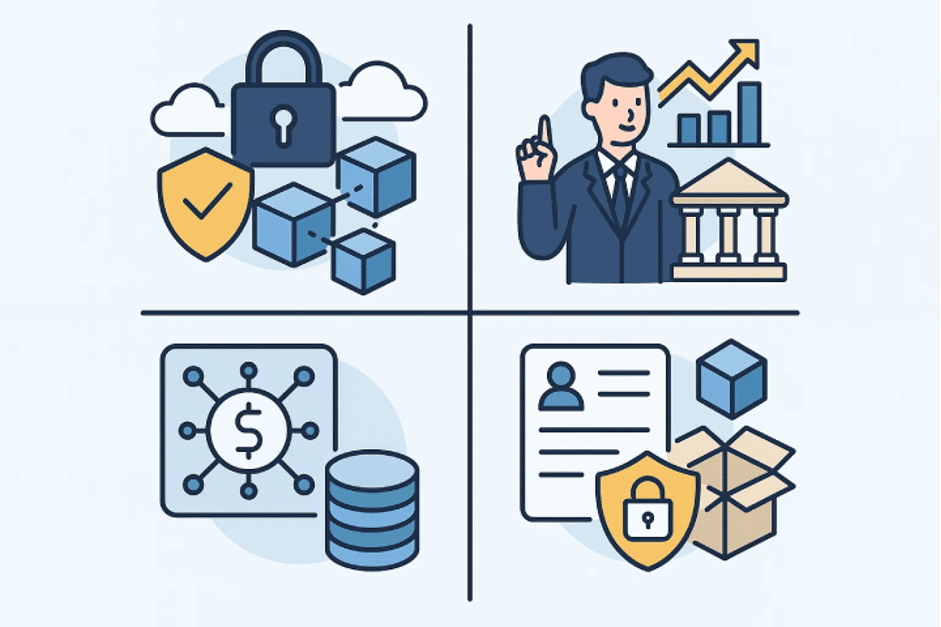Blockchain technology is progressively becoming a driving force for companies across all business sectors. Cryptocurrencies enhance trust and ensure a high level of security in transactions between enterprises. This is due to the ability to track information sent across business networks. Additionally, by eliminating intermediaries, corporations benefit from reduced transfer fees, leading to more efficient fund management.
Reasons for Blockchain Integration in Major Companies
Large companies and corporations are continually seeking ways to automate processes, thereby reducing errors and ensuring operational transparency. Blockchain-based digital assets, such as Bitcoin, Litecoin, Solana, Cardano, Ethereum, or USDT, are perfectly suited to help with this. It’s important to note that cryptocurrency ensures transparency in supply chains, allowing businesses to track products online from creation to consumer delivery. This approach is particularly crucial in the food, pharmaceutical, and other industries where counterfeit products can be deadly. Each record on the blockchain is securely protected from being rewritten, cannot be altered, and is open for viewing at any time.

Furthermore, blockchain guarantees a high level of security in company operations. Imagine working directly, without intermediaries, which means you don’t have to disclose your data, contracts, and transactions to third-party companies or providers. This operational format is more transparent and secure, capable of strengthening interactions between departments, transaction participants, contractors, and outsourced teams.
Automating payments with smart contracts significantly reduces errors often seen in manual payment processing. You won’t have to fill out any documents, correctly enter long account numbers, or other details. Good examples of blockchain integration across various industries are shown in the table below:
| Industry | Example of Blockchain Use | Result of Implementation |
| Logistics | Online cargo tracking | Increased supply chain transparency and reduced losses |
| Finance | Smart contracts and DeFi | Instant money transfers without intermediaries |
| Healthcare | Secure medical information protection | Reduced data leaks, eliminated errors, simplified access for doctors and patients |
| Real Estate | Digitization of property rights | Less bureaucracy and faster transaction processing |
| iGaming (Casinos) | Instant crypto transactions and NFT bonuses | High level of security, anonymity, and confidentiality |
Real-World Examples of Blockchain Technology Applications Across Industries
Above, we discussed several aspects of blockchain use in different industries. Let’s delve deeper into the main areas:
- Logistics: Large corporations, such as Maersk and FedEx, have long utilized blockchain for product tracking. This approach helps ensure delivery accuracy and makes logistics chains more transparent. This positively impacts the reduction of lost goods or cargo delays.
- Financial Sector: Banks and financial companies have integrated blockchain to facilitate faster operations for lending or insurance, as well as for managing and distributing funds. DeFi significantly improves the payment landscape by eliminating intermediaries, which allows for reduced commission fees and faster transactions.
- Healthcare: Blockchain in medical institutions is used for storing various medical information. With its help, patients can quickly find their records without the risk of data loss.
- Real Estate: In many countries, blockchain helps maintain property registries, simplifying the buying/selling process without lengthy bureaucratic procedures.
Jackpot Jill Casino: A Successful Example of Blockchain Integration
Our experts chose Jackpot Jill Casino as an example for good reason, as this site is a prime illustration of blockchain integration into the gambling world. The club’s owners offer players the option to place bets using BTC, USDT, LTC, and other digital currencies, reducing deposit and withdrawal processing times to 0-15 minutes. Moreover, the casino expands opportunities for players located in regions where gambling is restricted. Cryptocurrency isn’t tied to any single country, bank, or owner, allowing for play without legal repercussions.
Additionally, processing payments with cryptocurrency at Jackpot Jill guarantees anonymous gameplay. You can learn more about the platform’s features at https://jackpotjill-casino-aus.com/ site. We would like to note that such transactions are kept confidential and are not disclosed to third parties. You don’t need to enter your contacts or personal details, long account numbers, or bank card information. Payments at Jackpot Jill are made using a generated wallet address and are processed instantly.

Let’s not forget the possibility of receiving NFT bonuses—unique non-fungible tokens (tokenized art, music, paintings, and more). This ensures access to trends and provides Jackpot Jill with a competitive edge in the iGaming market.
Benefits of Investing in Blockchain for Major Companies
A simple example of successful investment in blockchain is increased trust among transaction participants or partners. Transparent transactions inspire confidence due to the blockchain’s immutable ledger. This approach elevates the reputation of an international corporation, demonstrating openness and commitment to new technologies.
As clichéd as it may sound, paying for services and products in cryptocurrency can reduce costs. This is explained by the absence of intermediaries and the use of smart contracts for automated money transfers. Transactions now reach the balance within seconds, not weeks, ensuring efficient interaction.
We shouldn’t forget about the scalability of blockchain technology and its integration with various company structures and departments. NFT tokens, DeFi, and other aspects ensure flexibility and adaptation to new market realities. Blockchain also eliminates cyberattacks and transaction failures, which builds trust and fosters a healthy ecosystem for business development.
